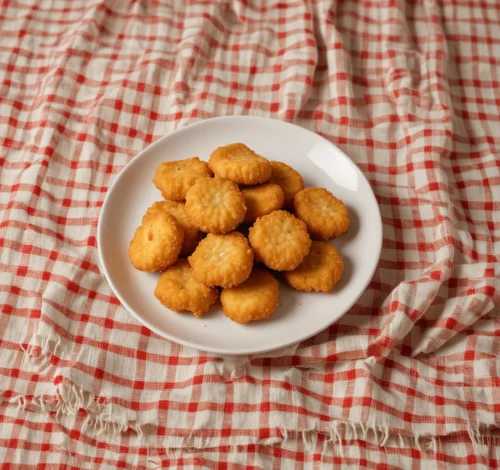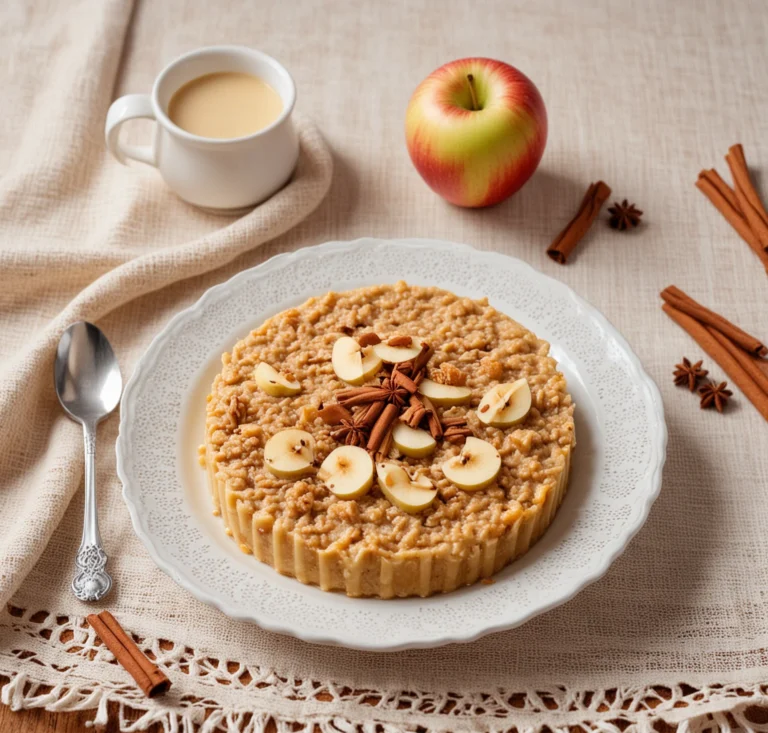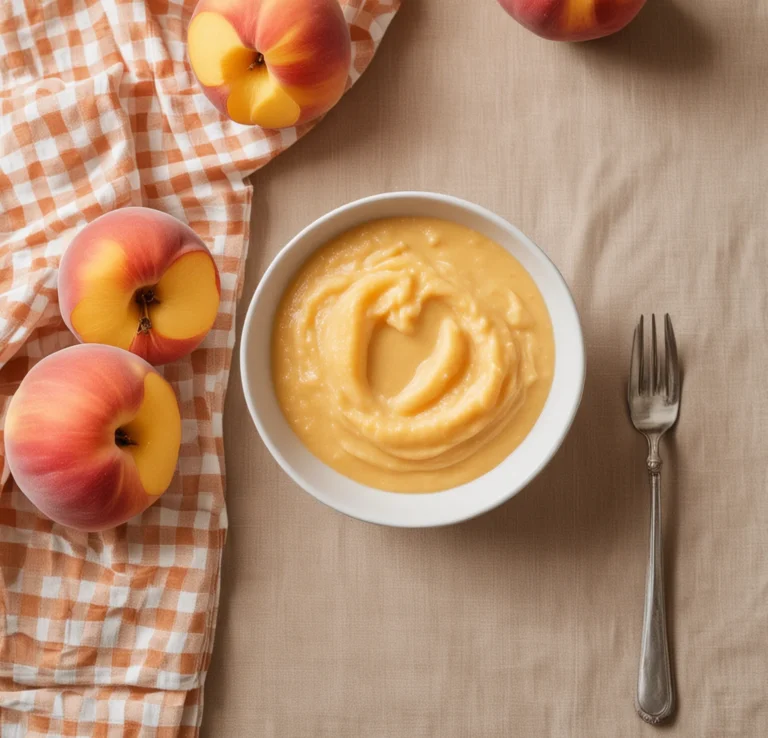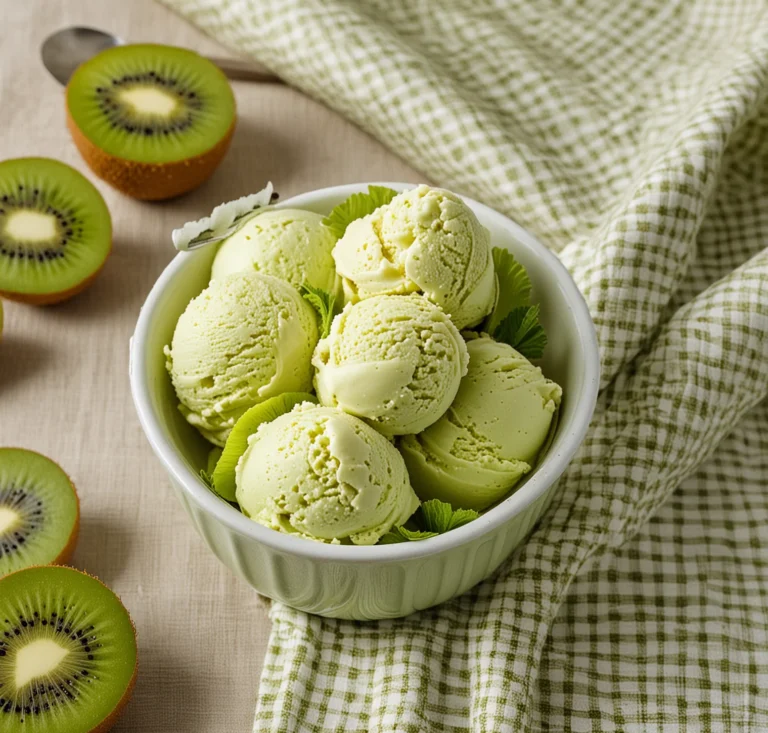Chicken for Babies is an important introduction to solid foods, especially considering its richness in iron, a vital nutrient for your little one’s development. As you embark on this culinary adventure, exploring Chicken Recipes for Baby becomes both exciting and essential. Knowing how to cook chicken for babies is the first step, ensuring it’s tender and easy to chew. Homemade chicken nuggets for baby provide a delightful finger food option, while chicken puree for baby offers a smooth transition to solid foods.
For added comfort and nutrition, chicken soup for baby is a soothing choice, especially during colder seasons. Crafting the perfect chicken soup recipe involves simmering chicken with nutritious vegetables until tender, creating a wholesome meal for your little one. Whether you’re learning how to make chicken puree for baby or mastering the art of homemade chicken nuggets, each dish is an opportunity to introduce diverse flavors and textures while nourishing your baby’s growing body.”
Chicken for babies is a powerhouse of nutrients, particularly protein, essential for babies’ growth. Its low fat content, ease of cooking, and delicious taste make it an ideal choice for infants. Before incorporating chicken into your baby’s diet, it’s crucial to gather information. Is your baby ready for chicken consumption? At what age should you introduce it? How should you cook chicken, and what recipes are suitable? We’ll address these questions in this article.
| Read the article about Kiwi for Babies; Kiwi Smoothies and Ice Cream for Babies. |
Benefits of Chicken for Babies Health
- Muscle Growth: Chicken’s protein content supports the development of baby’s muscles, with animal-based protein being easier to digest.
- Circulatory System Support: Iron in chicken aids in red blood cell production, crucial for oxygen transportation, while potassium promotes healthy blood vessels.
- Immune System Boost: Micronutrients like zinc and magnesium in chicken enhance immunity, guarding against infections and diseases.
- Bone Strength: Chicken’s phosphorus and calcium content fosters robust bone growth.
Doctors and nutritionists suggest introducing chicken to babies around 9 months old to compensate for declining iron levels in breast milk. However, some parents introduce chicken as early as 6 months, serving cooked chicken puree alongside vegetables and fruits. Ensure chicken is offered throughout the day for optimal digestion.
How much chicken should I give my baby?
Begin with clear chicken broth, creating a watery soup easily manageable for your child. Once your baby develops a taste for it, progress to chicken puree. Initially, offer around 2 tablespoons of puree per day, gradually increasing the portion size over time. After reaching one year and as your child learns to chew, introduce small pieces of chicken.
Does chicken cause allergies in babies?
Introducing any new food to your child carries the risk of allergic reactions. Follow the 3-day rule: introduce one new food over a three-day period and monitor for any allergic symptoms. Babies with sensitive digestive or weak immune systems are more susceptible to chicken allergies. Although cooking methods can mitigate allergen effects, remain vigilant for signs of allergy, such as:
- Swelling: Particularly in the face, neck, eyelids, throat, or nose, which may lead to difficulty in breathing or opening eyes.
- Abdominal Pain: Including cramping, diarrhea, and vomiting.
- Skin Inflammation or Hives: Itchy, red bumps on the skin.
- Fatigue: General weakness and tiredness in the baby.
Can you add salt to baby chicken soup?
Avoid adding salt to baby food, as excessive salt intake can strain a child’s kidneys, especially under one year old. Allow your child to experience the natural flavors of foods without added salt.
Safety tips for serving chicken to babies
- Opt for organic, hormone-free, or locally sourced chicken for baby food, avoiding varieties treated with hormones or antibiotics.
- Inspect chicken for any signs of spoilage or bleeding before purchase.
- Avoid frozen chicken due to potential bacterial growth; instead, opt for fresh chicken and refrigerate for no more than two days.
- Thaw frozen chicken in the refrigerator, avoiding microwave thawing to prevent bacterial growth.
- Keep chicken separate from other ingredients and clean utensils thoroughly after handling.
- Ensure chicken is fully cooked for baby consumption; never freeze cooked chicken for later use.
- Boil chicken for at least 30 minutes for optimal safety.
Recipes with chicken for babies
Chicken Broth for Babies(+6 Month Old)
At six months old, your baby may not be ready for solid foods yet. Begin with chicken broth, a simple and nutritious option. Follow these steps:
Ingredients
- Bone-in chicken parts (for added minerals)
- Water
Instructions
- Place the chicken pieces in a pot and cover them with water.
- Bring the water to a boil, then reduce the heat and simmer.
- Cook the chicken until tender.
- Once cooked, strain the broth to remove any solids.
- Allow the broth to cool before serving to your baby.
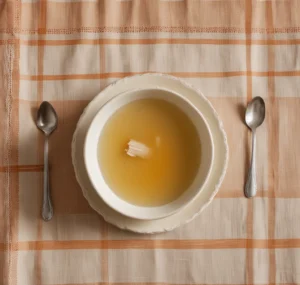
Simple Chicken Puree for Baby
A homemade dish rich in protein and flavor, ideal for introducing solids to your baby’s diet.
Ingredients
- Organic chicken
- Water or chicken stock
- Dry parsley (optional, for added flavor)
Instructions
- In a medium pot, combine cubed chicken breast, water, and dry parsley.
- Bring to a boil, then reduce heat and simmer for 30 minutes until chicken is fully cooked.
- Allow the chicken to cool, then transfer to a blender and puree until smooth.
- Adjust the puree’s consistency with chicken broth if needed.
- Serve alone or with vegetable puree to your baby.
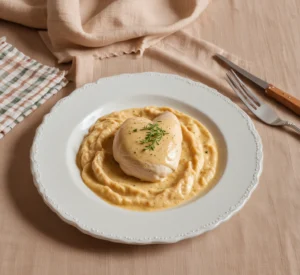
Chicken Porridge with Rice for Babies (+6 Months)
A nutritious and energy-rich meal perfect for older babies.
Ingredients
- 2 cups shredded boneless chicken
- 1 cup rice
- 5 cups water
- Ripe banana (optional)
Instructions
- Cook chicken and rice separately in plenty of water until fully cooked.
- Blend chicken and rice together with extra water to create a smooth puree.
- For younger babies, strain the mixture for smoother texture.
- Optionally, add mashed ripe banana for sweetness.
- Avoid adding sugar or salt, as per baby’s dietary guidelines.
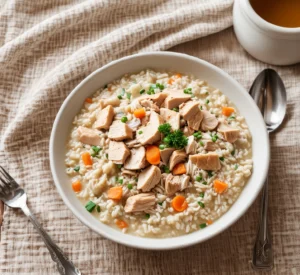
Chicken Puree with Mashed Potatoes for Babies (+6 Months)
Combine the goodness of chicken and potatoes for a balanced meal.
Instructions
- Prepare mashed potatoes and chicken puree separately.
- Combine the two, adjusting the consistency with water or breast milk.
- This meal provides a mix of carbohydrates, proteins, and fats, ideal for your baby’s growth.
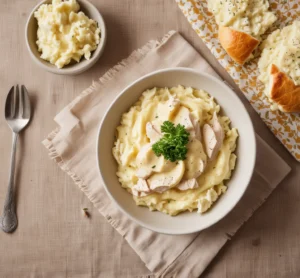
Vegetable and Chicken Soup for Baby
A comforting and nutritious option, especially during colds.
Ingredients
- Chicken meat with bones
- 2 cloves garlic
- 2 medium onions
- 1 carrot
- 1 medium potato
- ½ cup rice
- Black pepper (to taste)
Instructions
- Cook chicken with onion and water, then remove the skin and strain the broth.
- Add chopped vegetables and rice to the broth.
- Cook until vegetables are tender, then blend into a smooth soup.
- Serve warm to soothe your baby and boost their immune system.
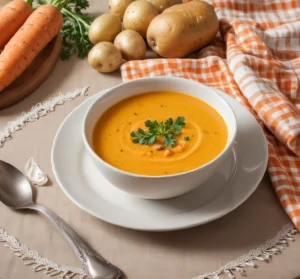
Chicken and Spinach Puree for Babies (+1 Year)
Combining chicken and spinach creates a delicious and nutritious meal your child will love.
Ingredients
- 2 cups boneless chicken breast, chopped
- 2 cups spinach, chopped
- 4-5 cups water
Instructions
- Boil the spinach and boneless chicken separately.
- Once cooked, strain the spinach to remove oxalic acid, which may not be suitable for all babies.
- Puree the chicken as directed and add it to the spinach.
- Adjust the food’s consistency with chicken broth if needed.
Chicken Balls for Babies (+1 Year Old)
These tasty and nutritious chicken balls are perfect for older children and make a great lunch option.
Ingredients
- 2 cups chicken breast
- A pinch of salt and pepper
- Oil for frying
- 1 grated onion, drained
Instructions
- Wash the chicken breast thoroughly and grind it.
- Combine the minced chicken with grated onion, salt, and pepper.
- Shape the mixture into small balls.
- Heat oil in a pan over medium heat and fry the chicken balls until cooked through.
- Serve alongside vegetable puree of your choice.
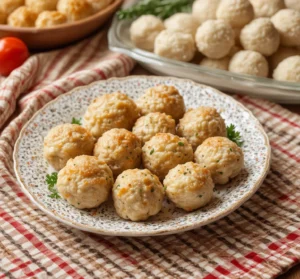
Homemade Chicken Nuggets for Baby (+1 Year Old)
These homemade chicken nuggets are healthy, protein-rich, and free from additives found in commercial options.
Ingredients
- 400 grams chicken breast fillet, cut into pieces
- 40 grams white flour
- 1 large egg, beaten
- 3 slices wholemeal bread (to make breadcrumbs)
- Oil for frying
Instructions
- Prepare breadcrumbs by blending toasted bread slices.
- Set up a production line with three bowls: one with flour, one with beaten egg, and one with breadcrumbs.
- Dip each chicken piece first in flour, then in egg, and finally coat with breadcrumbs.
- Fry the coated chicken pieces in oil until golden brown on both sides.
- Transfer the cooked nuggets to a greased oven tray and bake for 10 minutes to ensure thorough cooking.
- Serve as a healthy finger food option for your baby, adjusting the size of the pieces as needed.

Mini Chicken Burgers for Babies (+1 Year Old)
These mini chicken burgers are not only fun but also delicious and nutritious, perfect for little ones.
Ingredients
- 2 tablespoons olive oil
- 1 medium onion, grated
- 1/2 carrot, grated
- 300 grams minced chicken meat
- 1 egg
- 2 tablespoons pureed tomatoes
- 100 grams breadcrumbs (prepared as per previous recipe)
- A pinch of salt and pepper
Instructions
- Fry grated onion and carrot in olive oil until softened.
- In a bowl, mix minced chicken, breadcrumbs, cooked onions and carrots, egg, pureed tomatoes, salt, and pepper.
- Shape the mixture into small burgers.
- Fry the mini burgers until golden brown on both sides.
- Serve with mashed potatoes or vegetable puree for a complete meal option.

Chicken and Mushroom Roll Pancakes for Babies (+1 Year Old)
These pancakes are not only delicious and fun but also nutritious, providing a balanced mix of protein and carbohydrates, perfect for lunchtime.
Ingredients
- 75 grams of white or wholemeal flour
- 2 large eggs
- 150 ml milk
- 1 tablespoon olive oil
- 225 grams chicken, cut into small pieces
- 3 large mushrooms, sliced
- 1/2 tablespoon mustard sauce
- A pinch of salt and pepper
- 1 teaspoon baking powder
Instructions
- In a mixing bowl, combine half of the milk, flour, and eggs until smooth using a mixer, ensuring no lumps remain. Then add the remaining milk and mix until smooth.
- Transfer the pancake batter into a small pitcher for easy pouring.
- Heat a 20 cm diameter pan over medium heat and add a little oil.
- Pour a small ladleful of batter into the pan, spreading it to cover the entire surface.
- After 2 minutes, flip the pancake to cook the other side. Repeat until all the batter is used, placing cooked pancakes on a wire rack to cool.
- In another pan, heat oil and add chopped chicken, seasoning with salt and pepper. Cook until chicken is fully cooked.
- Add sliced mushrooms to the pan and continue cooking for 3 minutes.
- Stir in mustard sauce and mix well.
- Spoon some of the chicken and mushroom mixture onto each pancake and roll them up.
- Secure each roll with a toothpick, remembering to remove it before serving.
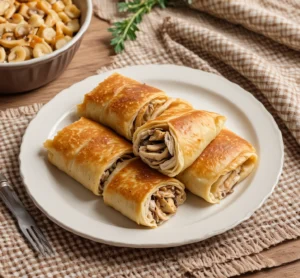
Conclusion
Chicken for babies offers numerous health benefits, including muscle growth, strengthened circulatory system, improved bone health, facilitated brain development, dental health, fluid balance, energy production, and a rich source of iron, all contributing to bolstering the immune system.
When introducing chicken to your baby’s diet, opt for lean cuts such as chicken thigh, which provides high protein content with low fat. However, always assess your baby’s digestion ability and seek advice from a healthcare professional before introducing new foods.
